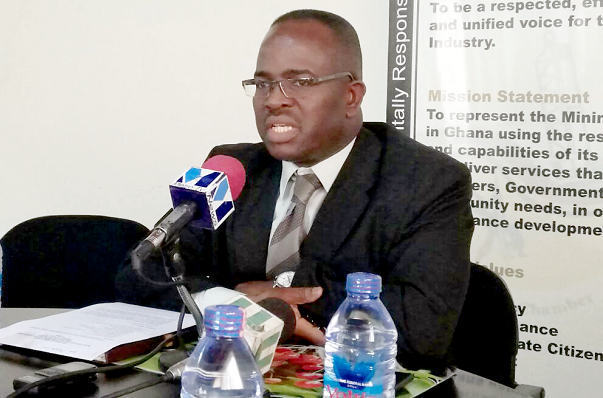
Accra, Ghana//-Ghanaians stand to benefit if the hurdles of exploration in terms of upfront costs are reduced to facilitate effective exploration and consequent commercial finds, CEO of the Ghana Chamber of Mines, Dr Sulemanu Koney has said.
To this end: “We urge the government to put in place an incentive scheme that will reduce the cost associated with exploration and therefore attract the required critical investments into this high-risk business of mineral exploration”, he told some selected members of the Journalists For Business Advocacy (JBA) in Accra over the weekend.
As a first step, Dr Koney requested the government to exempt exploration companies from payment of VAT on big ticket cost items such as Drilling and Laboratory Services.
More benefits
The CEO said that the potential gains Ghana stands to benefit from the removal of taxes on exploration in the sector are enormous.
One of the key benefits is that it would encourage more potential mining investors both foreign and domestic to begin exploration in the industry.
He explained: “Exploration is the single most critical activity that guarantees continuous production of mineral and discovery of new mineral resources to supplement production from existing mines or replace output of mines whose economic ore body is exhausted”.
“It is also worth noting that the preponderant share of exploration licenses issued by the Ministry of Lands and Natural Resources is held by Ghanaians who are usually constrained in raising capital to finance the high-risk business of exploration”.
But if these taxes are removed, more Ghanaian investors would venture into exploration thereby boosting local participation in the industry, according to Dr Koney.
This would enable the country to have more mineral deposits from which it could gain the needed foreign exchange revenues which are critical for the stability of the Ghanaian currency.
Exploration incentives in other jurisdictions
In Australia, the government made more than 31million Australian dollar available for 46 mining companies under the Junior Minerals Exploration Incentive (JMEI) for 2018-19
This scheme gave smaller or ‘junior’, exploration companies a strong incentive to explore new areas for mineral deposits.
The incentive was implemented to increase exploration activities as well to secure a pipeline of projects for the future and remain competitive with other prospective nations.
In Nigeria, incentives on exploration activities are being offered to companies willing to explore mineral resources in the Africa’s largest economy.
As Nigeria is seeking to diversify its economy, with mineral resources including gold, zinc, iron ore and other rare earth metals all on its radar, Dr Koney explained.
The country granted ten exploration companies three to five year ‘tax holidays’, duty waivers on imported equipment, and the ability to take profits out of Nigeria, he noted.
Mineral proceeds for Ghana
Proceeds from Ghana’s export of minerals have increased to $6.998 billion in 2020 from $6.678 billion in 2019.
This represents a growth rate of 4.8 per cent, according to data from the Bank of Ghana (BoG). The mining industry remained the main anchor of Ghana’s trade balance, it added.
It showed that the mining sector was the foremost source of foreign exchange receipts in 2020 as the mineral sector alone accounted for 48.4 per cent of gross merchandise exports in 2020.
“This compares favourably with the 42.6 per cent recorded in 2019 and far outstripped the combined contribution of crude oil and cocoa in 2020 by more than 12 percentage points.
The mining industry continued to support the economy by reducing the pressure on the local currency and its resultant impact on prices and other parameters”, President of the Ghana Chamber of Mines, Eric Asubonteng, explained at the virtual 93rd Annual General Meeting (AGM) of the Chamber held in June 2021.
He revealed that producing member companies of the Chamber returned $3.67 billion out of the mineral revenue of $5.14 billion to the country. This represents 71 per cent of the revenue of producing member companies.
“The proportion of mineral revenue returned exclusively through commercial banks was more than the statutory threshold prescribed in the various Development Agreements as well as the Minerals and Mining Act 2006 (Act 703). This further emphasizes the Chamber’s commitment to supporting the growth of Ghana’s economy”.
By Masahudu Ankiilu Kunateh, African Eye Report


